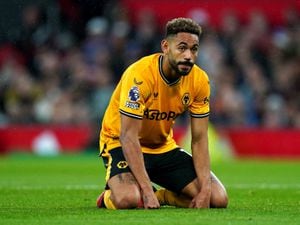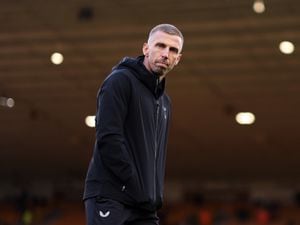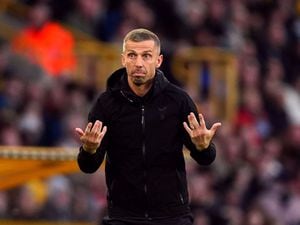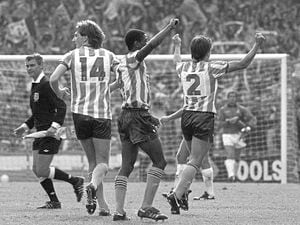Sky Sports' Johnny Phillips: Ex-Gunner Oleg Luzhny sets his sights on Premier return
It is 20 seasons since Arsenal were on their way to a second double in the space of five years.
The 2001/02 team lost only three games all season, giving a hint of what was to come a couple of years later during their Invincibles season.
Among their number in defence that campaign was a hero of Ukrainian football. Oleg Luzhny won eight league titles in the Soviet Union and then Ukraine, after the declaration of independence, with Dynamo Kiev. He played a key part in Kiev’s dominance of football in his homeland throughout the 1990s.
Luzhny also made 60 international appearances, captaining Ukraine on 37 appearances. The first of his caps, for the USSR, came at the age of 20 and only injury kept him out of an appearance at the 1990 World Cup finals, which was the last tournament before the break-up of the Soviet Union.
Now, he is hoping to make his mark in English football once again, this time from the dugout.
Luzhny, who spent one unsuccessful season with Wolves following their promotion to the Premier League under Dave Jones, is well aware that there has been an absence of top coaches from the former Soviet states in the English game, although he has at least one high-profile backer.
“Luzhny has a crazy passion for football,” his former manager, Arsene Wenger, once said. “When I watched him at work, I felt that he should become a good coach. He lives by the game.”
It is a ringing endorsement for the man who spent eight years, over several spells, as assistant manager at Dinamo Kiev.
Luzhny has watched his former team-mate Patrick Vieira settling in at Crystal Palace this season and, over a Zoom call from Kiev this week, the 52-year old explained why he is looking to break into the English game once more, when the opportunity arises.
“I feel ready and confident to start work in England,” he said. “With so much experience of European football and in the Champions’ League, I can bring good discipline to any team.
“If you look at Arsene Wenger, Sir Alex Ferguson, Fabio Capello and Valeriy Lobanovskyi (former Dynamo Kiev and Soviet Union manager) they all bring good discipline. Of course, they have good players, but the discipline inside the dressing room and on the pitch is hugely important.
“Decision-making under pressure can separate the best teams from the poor ones. Bad decisions are not made through a lack of skill or innate judgement: they are made because of an inability to handle pressure at the pivotal moment.”
Some of Luzhny’s finest performances came on the biggest stages.
He will never be forgotten in his homeland for the part he played in Dinamo Kiev’s dramatic rout of Barcelona in the 1997/98 Champions’ League, winning 3-0 at home and 4-0 away against Louis Van Gaal’s side, on the way to his side finishing top of a group that also contained Newcastle United.
Luzhny was tasked with the job of keeping Luis Figo quiet over the two matches against Barca, a job he clearly succeeded in. But his fondest moments as a player came during his time in England.
“I remember having a choice between moving to Newcastle, West Ham, Middlesbrough and Arsenal,” he recalled. “I’d played against Arsenal in the Champions League and knew a bit about the club and London, so it was an easy decision to move there.
“A lot of us lived close to each other in High Barnet – Patrick Vieira and Marc Overmars were neighbours. We became good friends and I still speak with Freddie Ljungberg and Gilles Grimandi today.
“The UEFA Cup run to the final in 2000 and then the double-winning season were some of the best times in my career. I enjoyed every year there, it was the happiest time of my life. We had great players and a top coach with great backroom staff. Arsene Wenger was great at explaining to players, individually, what he wanted from them. He was such a clever coach.”
So is Luzhny a chip off his old manager’s block? In terms of approach, he is arguably a disciple of the style of football that marked Arsenal out as champions 20 years ago.
“I like attacking football, but not necessarily the Barcelona way, but a direct approach to attacking that is not long ball,” he explained. “A controlled way of moving the ball to the front. Every player should look forward. I’d like to do something special as a manager. I was able to achieve big things as a player and I’d like to do the same as a coach.”
A number of Ukrainians have tried their hand at playing in the Premier League. Oleksandr Yevtushok arrived before Luzhny, as a defender tasked with keeping Coventry in the top flight back in 1997.
Since then Sergei Rebrov, Andriy Shevchenko, Andriy Voronin and Oleksandr Zinchenko have all added to the small band of players looking to make an impression over here. But there has never been a Ukrainian manager in the upper echelons of English football. Luzhny is hoping to change that if the opportunity arises.





